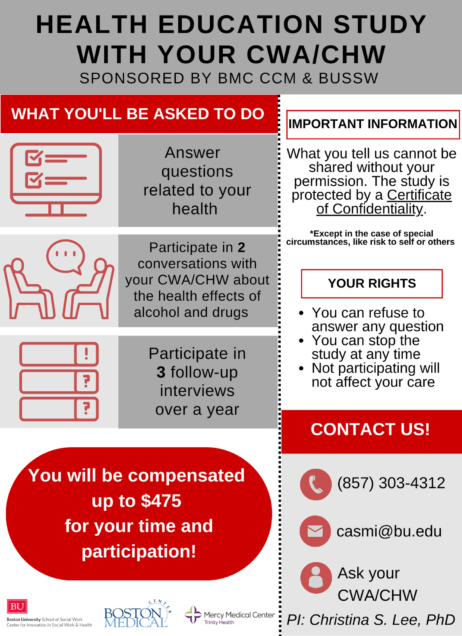Addressing Alcohol Use-Related Health Disparities: A Hybrid Effectiveness Implementation Study of a Culturally Adapted Motivational Interview for Latino/as

Optimizing MI to minimize substance use-related health disparities among marginalized groups: The CAMI model
Low SUD treatment engagement and retention contribute to health disparities among communities of color. Improving the quality of treatment by making it more relevant to the needs and priorities of marginalized groups may help reduce health disparities. A model of Motivational Interviewing (“CAMI”) was developed that optimized MI to target the drivers of substance misuse – structural stigma and racism. Randomized clinical trials showed that the CAMI was associated with significant reductions heavy drinking, harms related to drinking, and improvements in mental health, for people who experienced discrimination (K2314905, Lee, PI; R01021136, Lee, PI; R01AA01025564 Karno, PI). In the current Phase 3 trial that uses a Hybrid Type 1 design (R01AA025485, Lee, PI), community health workers are delivering the CAMI to Latino/a primary care patients who are considered hardest to reach, or most at risk, due to complex medical and behavioral health needs. It is also a test of implementation process – examining the integration of a clinical innovation, the CAMI, into a busy clinical setting. Given the shared focus on stigma and discrimination, the CAMI is also being pilot tested with Black adults who misuse substances in primary care as well. This is a partnership with the Complex Care Management Program at the Boston Medical Center (Christine Pace, MD, PI; Mari-Lynn Drainoni, PhD), Mercy Medical Center (Ari Kriegsman, MD, site PI), Brown University Center for Alcohol and Addiction Studies, and the Sargent College of Rehabilitation, Boston University.
NIH-NIAAA Grant: R01AA028507 (09/10/2020 – 06/30/2025)